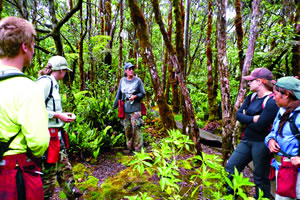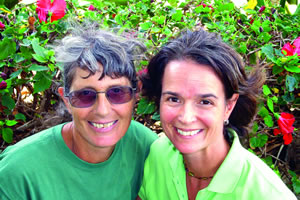Disney Funds Koke‘e Habitat Research

Katie Cassel works with summer interns (from left) Jackson Brumblay, Marcela Brimhall, Tess Tarling and Nicki Ozaki. Photo courtesy Cali Crampton
A grant allows researchers to measure exactly how removal of alien plants benefits native species
The perpetuation of native flora and fauna just got easier, thanks to a grant from the Disney Worldwide Conservation Fund.
Awarded to Garden Island Resource Conservation and Development to help support its project, Koke’e Resource Conservation Program’s Restoring Habitat for Hawaiian Native Birds, the money is part of $2 million the Disney Worldwide Conservation Fund contributed this year to nearly 100 conservation projects across the globe.
Lisa “Cali” Crampton, head of the Kaua’i Forest Birds Recovery Project, and Katie Cassel, head of Koke’e Research Conservation Program, are working together on the project to help combat the spread of invasive species and ensure the survival of Kaua’i’s endemic plants and birds.
A major threat to the island is the explosion of weeds that displace native species.
“They don’t follow Hawaii protocol,” says Cassel, who attributes the phrase to kumu hula Puna Dawson.
With the aid of volunteers, Cassel will pluck weeds, clearing them from a designated plot of native forest in the Alakai Wilderness Reserve and Koke’e State Park.
The activity will serve as one of the main features of the project.
But what will be different about this particular grant is the partnership formed between Cassel and Crampton, who will be working together for the first time.
While Cassel is responsible for weed removal, Crampton will record the eradication’s effects on Kaua’i forest birds.

Katie Cassel (left) and Cali Crampton. Coco Zickos photo
“We know that weeds displace native plants, and we suspect they also have an impact on all the animals that depend on native plants,” says Crampton. “Documenting that effect is what the grant is all about.”
Originally from Canada, Crampton has been studying the island’s native birds for almost two years. She is most recently from Nevada, where she obtained her Ph.D.
She will research a plot undergoing weed removal treatment with one that is not undergoing a remedy in order to compare what happens to the birds and insects within those areas.
Since endemic birds require native plant fruits, nectar or insects for sustenance, it’s likely that the effects of weed extraction will be positive.
Protecting endemic plant species is imperative to the survival of Kaua’i’s native birds, particularly as their populations continue to rapidly decline. Of the island’s 17 endemic songbirds, nine are extinct and three of the remaining eight are endangered.
“As time goes by, they are pushed further and further into the Alakai (swamp) with all the threats they are encountering,” says Crampton.
Birds are not only important to the Hawaiian culture, they are a critical part of the island’s ecosystem. They perform many vital functions, including the dispersal of seeds and cross pollination of native plants.
“And they’re also just spectacularly beautiful and a symbol of how gorgeous and amazing and diverse Hawaii is,” says Crampton. “Hawaii has a very diverse human community and biological community, and the lesson these birds can teach us about evolution and diversity is really important.”
Hawaiian plants are just as significant in maintaining a healthy environmental balance, yet more than 140 species that exist in Koke’e and the Alakai are endangered.
The decline of these plants is something Cassel has been concerned about since she arrived on Kaua’i some 20 year ago. Her concerns led her to developing the Koke’e Resource Conservation Program in 1998, an organization supported by volunteers who continually help uproot alien species.
As an organic gardener and farmer, “weeding is second nature,” says Cassel.
Accumulating a large database of volunteers over the years was likely one of the reasons Cassel was able to secure the grant. It is this support by residents and visitors that also will be needed in order to conduct the upcoming study. Education and outreach also will be an important aspect of the project.
Preserving the biodiversity for future generations is essential and one of the reasons Cassel is so highly involved in protecting native habitats.
“I’m excited to find a job where I can make a difference,” says Crampton of why she, too, is devoted to preserving endemic species.
Receiving such funding in the current economic climate is something for which both Crampton and Cassel are extremely thankful, and they hope to continue to do so again next year.
Visit krcp.org or kauaiforestbirds.org for more information.



